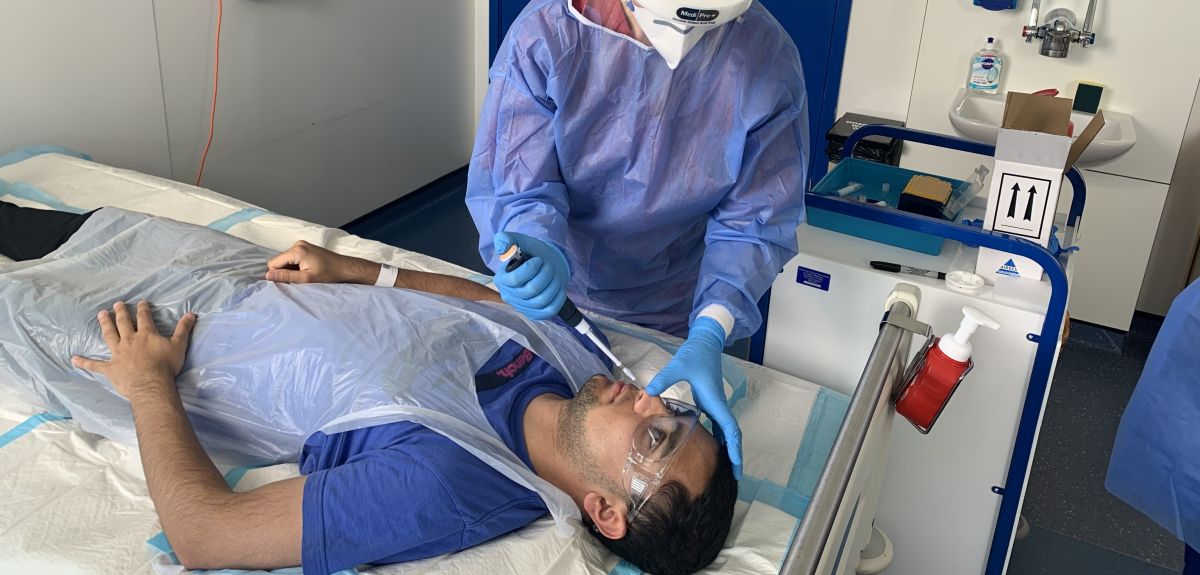
New study to improve vaccines and therapeutics development
A first-of-its-kind study led by the University of Oxford has successfully investigated human immunity against COVID-19 in people who already have antibodies against it.
The results suggest that previous infection, together with vaccination, offers strong protection against the original COVID-19 strain.
People who do not have antibodies against a particular infectious agent are ‘seronegative’ and those who have antibodies are called ‘seropositive’. Over 99% of the UK population and 59% of the world's population is seropositive, which means they already have antibodies against COVID-19. This means finding seronegative volunteers for an infection model is increasingly very difficult as most people have been either infected, vaccinated, or both.
For vaccine development, researchers create Controlled Human Infection Models (CHIMs), where they deliberately infect healthy volunteers under very carefully controlled clinical conditions. These CHIMs can then be used to rapidly test or compare new vaccines or treatments in a controlled environment. For this study, researchers wanted to use a COVID-19 CHIM to measure what kind of immune responses stop people who have been previously infected and/or vaccinated from being infected again.
The data from this COVCHIM01 study showed durable immunity post-infection/vaccination against the original COVID-19 virus. The study compared the immune responses of volunteers who were infected in this study with those who were uninfected and found that antibodies in the lining of the nose, the route the virus enters the body, may be important in preventing mild infections.
A number of participants who were able to avoid developing infection with the original strain of virus used in the study subsequently developed infections in the community with the Omicron variant. The researchers are investigating this further by pursuing the use of newer variants to create a CHIM with a sufficient rate of infection to enable the assessment of new vaccines or COVID-19 treatments.
Such studies are important to find the most efficient and effective way to test new treatments and vaccines so that they can be utilised as soon as possible.
Professor Helen McShane, Professor of Vaccinology at the Department of Paediatrics, Director of the National Institute for Health and Care Research Oxford Biomedical Research Centre and the lead and corresponding author of the COVCHIM01 study, said: ‘This is a really important proof of concept study demonstrating that controlled human infection studies can be safely carried out during a pandemic and importantly provide valuable information that is difficult to obtain in traditional field studies. We hope this provides confidence in the use of human infection studies as a tool both for the development of improved COVID vaccines and therapeutics and for potential future pandemics.’
Published in The Lancet Microbe, this was the first study undertaken at the new NIHR Oxford Clinical Research Facility, Churchill Hospital, Oxford and was funded by the Wellcome Trust, the Department for Health and Social Care/UK Health Security Agency and the NIHR Oxford Biomedical Research Centre.
 University of Oxford to lead new Sustainable Chemicals and Materials Manufacturing Research Hub
University of Oxford to lead new Sustainable Chemicals and Materials Manufacturing Research Hub
 Nine Oxford scientists elected as Royal Society Fellows
Nine Oxford scientists elected as Royal Society Fellows
 Ruskin School of Art appoints new Associate Professors
Ruskin School of Art appoints new Associate Professors
 Internet use statistically associated with higher wellbeing, finds new global Oxford study
Internet use statistically associated with higher wellbeing, finds new global Oxford study
 More local school children join sport and education sessions at Oxford as expanded community programme returns
More local school children join sport and education sessions at Oxford as expanded community programme returns